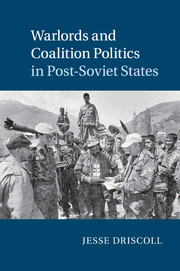Crossref Citations
This Book has been
cited by the following publications. This list is generated based on data provided by Crossref.
van der Maat, Eelco
2015.
Genocidal Consolidation: Final Solutions to Elite Rivalry.
SSRN Electronic Journal,
Montgomery, David W.
Heathershaw, John
Khalid, Adeeb
Lemon, Edward
and
Epkenhans, Tim
2016.
Researching Islam, Security, and the State in Central Asia: A Round Table Discussion.
Review of Middle East Studies,
Vol. 50,
Issue. 1,
p.
3.
Albrecht, Holger
and
Ohl, Dorothy
2016.
Exit, Resistance, Loyalty: Military Behavior during Unrest in Authoritarian Regimes.
Perspectives on Politics,
Vol. 14,
Issue. 1,
p.
38.
SHESTERININA, ANASTASIA
2016.
Collective Threat Framing and Mobilization in Civil War.
American Political Science Review,
Vol. 110,
Issue. 3,
p.
411.
Driscoll, Jesse
and
Maliniak, Daniel
2016.
Did Georgian Voters Desire Military Escalation in 2008? Experiments and Observations.
The Journal of Politics,
Vol. 78,
Issue. 1,
p.
265.
Malejacq, Romain
and
Mukhopadhyay, Dipali
2016.
The ‘Tribal Politics’ of Field Research: A Reflection on Power and Partiality in 21st-Century Warzones.
Perspectives on Politics,
Vol. 14,
Issue. 4,
p.
1011.
2016.
Rebelocracy.
p.
403.
Driscoll, Jesse
Berglund, Christofer
and
Blauvelt, Timothy
2016.
Language hierarchies in Georgia: an experimental approach.
Caucasus Survey,
Vol. 4,
Issue. 1,
p.
44.
Gledhill, John
2017.
When state capacity dissolves: Explaining variation in violent conflict and conflict moderation.
European Journal of International Security,
Vol. 2,
Issue. 2,
p.
153.
Siroky, David S.
and
Hale, Christopher W.
2017.
Inside Irredentism: A Global Empirical Analysis.
American Journal of Political Science,
Vol. 61,
Issue. 1,
p.
117.
Sambanis, Nicholas
Skaperdas, Stergios
and
Wohlforth, William C.
2017.
External Intervention, Identity, and Civil War.
SSRN Electronic Journal ,
Dell'Aguzzo, Loretta
2017.
Modes of transition and the timing of separatist war onset: a comparative analysis of South Ossetia and Kosovo.
Nationalities Papers,
Vol. 45,
Issue. 5,
p.
928.
2017.
Conservative Parties and the Birth of Modern Democracy in Europe.
p.
428.
2017.
Forbearance as Redistribution.
p.
381.
Mosinger, Eric S
2018.
Brothers or others in arms? Civilian constituencies and rebel fragmentation in civil war.
Journal of Peace Research,
Vol. 55,
Issue. 1,
p.
62.
Epkenhans, Tim
2018.
Author Response on the Book Review Roundtable
The origins of the civil war in Tajikistan: nationalism, Islamism and violent conflict in post-Soviet space
, by Tim Epkenhans, Lanham et al., Lexington Books, 2016, 401 pp., £84.63 (hbk), ISBN: 978-1-4985-3278-5
.
Civil Wars,
Vol. 20,
Issue. 3,
p.
451.
Markowitz, Lawrence P.
and
Omelicheva, Mariya Y.
2018.
Disciplined and undisciplined repression: illicit economies and state violence in Central Asia’s autocracies.
Post-Soviet Affairs,
Vol. 34,
Issue. 6,
p.
367.
Heathershaw, John
2018.
The Afghan-Central Asian borderland: the state and local leaders.
Central Asian Survey,
Vol. 37,
Issue. 3,
p.
484.
Lewis, David
Heathershaw, John
and
Megoran, Nick
2018.
Illiberal peace? Authoritarian modes of conflict management.
Cooperation and Conflict,
Vol. 53,
Issue. 4,
p.
486.
Gledhill, John
2018.
Disaggregating Opportunities: Opportunity Structures and Organisational Resources in the Study of Armed Conflict.
Civil Wars,
Vol. 20,
Issue. 4,
p.
500.





